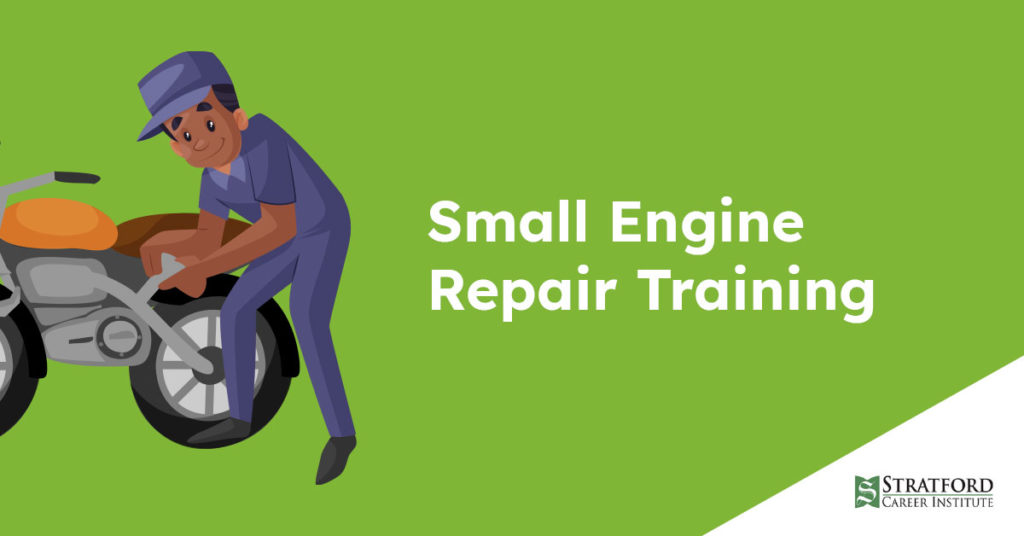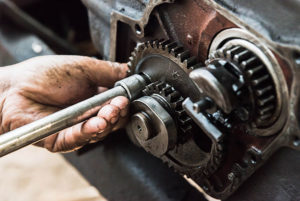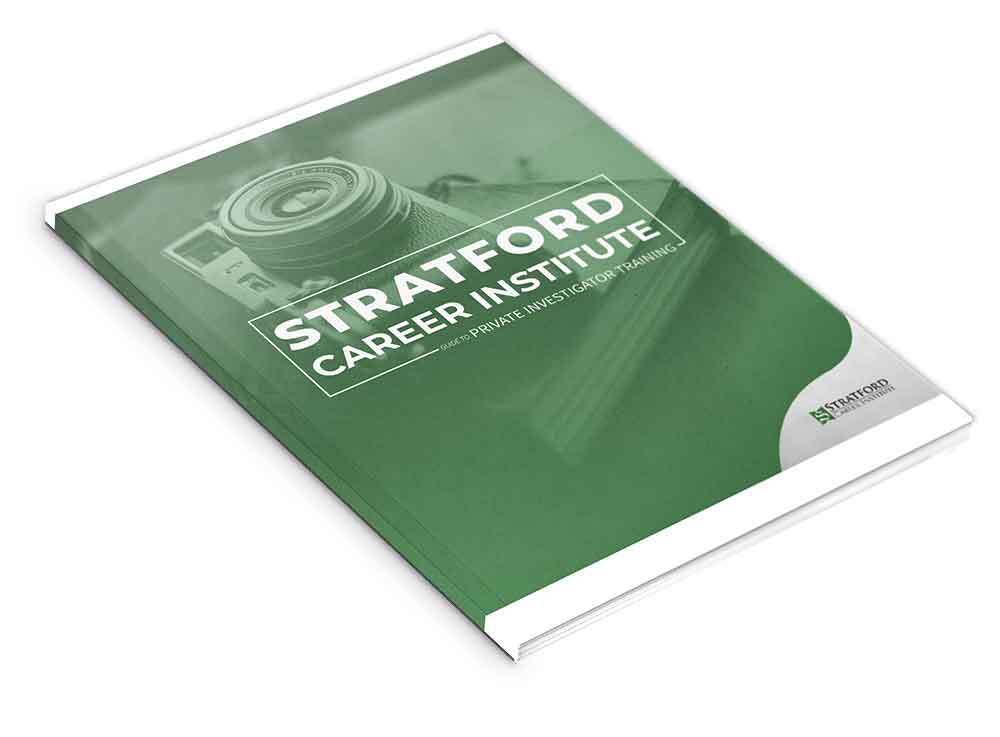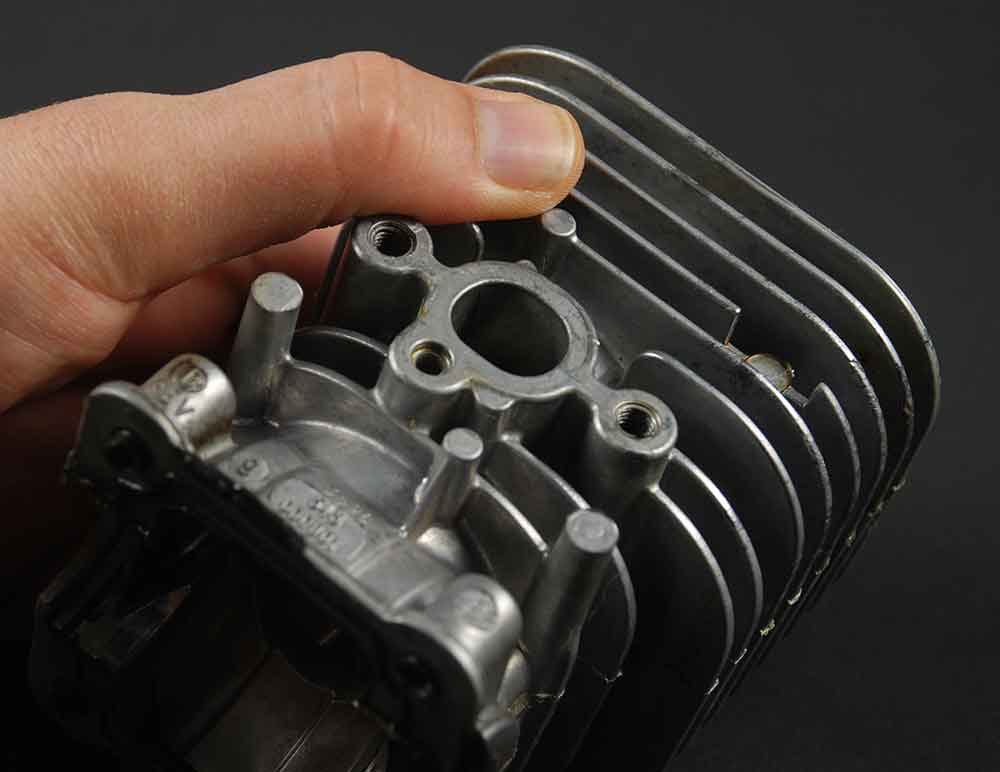
Due to the fact that there are such a wide variety of applications of the small engine, a course in small engine repair is much more likely to stick to basic concepts instead of concerning itself with how to repair specific engines in specific equipment.
So, if you choose to learn small engine repair in a course, what should you expect? Here is a general list of things covered in Small Engine Repair Training.
Small Engine Repair Basics
Before you can work on a small engine, you need to understand how it works. That means an understanding of the parts inside—such as spark plugs, carburetors, and fuel systems—along with how they interact.
A few important things you can learn in training include:
- The purpose of fasteners, sealants, and gaskets;
- The basics of electricity and magnetism;
- How an electric charge starts a small engine; and
- How a spark plug works.
You’ll also learn important lessons to help you when you’re repairing engines, including things like the difference between two and four-stroke engines.
Parts of the Engine
Making a small engine function properly again requires not just knowledge of the basics, but an understanding of how the basic parts come together and work as a whole. Other integral parts can include:
- Carburetors. These components are responsible for mixing air and fuel in the correct ratio for combustion in the engine. You will learn about the various components of a carburetor such as the throttle valve, venturi, float bowl, jets, and idle circuit.
- Ignition systems. Ignition consists of electrical components responsible for igniting the air-fuel mixture in the engine’s combustion chamber. You can expect to learn about components like spark plugs, ignition coils, distributors (if applicable), and electronic ignition modules.
- Cooling systems. This section usually covers the mechanisms used to regulate engine temperature and prevent overheating. Understanding the principles of heat transfer and how coolant circulates through the engine to dissipate heat is an essential part of most small engine repair courses.
- Airflow systems. When learning small engine repair, you need to know how air is drawn into the engine for combustion and how exhaust gases are expelled. This includes learning about components such as air filters, intake manifolds, carburetors or fuel injectors, and exhaust systems.
- Fuel systems. This area focuses on the delivery of fuel to the engine for combustion with components like fuel tanks, fuel lines, fuel pumps, fuel injectors, and fuel filters. It is also a great opportunity to learn the importance of fuel quality and proper fuel system maintenance for engine longevity.
- Cylinders, crankshaft, and pistons. In this section, courses usually cover the components of the engine responsible for generating power. This includes the function of cylinders, pistons, connecting rods, and the crankshaft in the engine’s combustion process.
An understanding of these parts of the engine will help you to understand the design of most small engines you will encounter and to be able to fix them.
Diagnostics
A good portion of small engine repair basics focuses on developing diagnostic skills. You will learn how to identify common issues with starting, poor performance, and unusual noises. Systematic approaches to troubleshooting, including visual inspections, testing electrical systems, and using tools such as compression gauges and multimeters, are a fundamental part of the process.
Maintenance
When you learn small engine repair, most courses will also focus on maintenance. Understanding preventive maintenance can help prolong the life of small engines you work on and prevent breakdowns. Expect to learn how to perform routine maintenance tasks such as oil changes, air filter replacement, and spark plug inspection.
You may also gain knowledge about the proper storage and seasonal maintenance of equipment to ensure it remains in optimal condition year-round. Emphasizing the importance of regular maintenance instills good habits that can save both time and money in the long run.
Tools and Safety

Much like a shop class where you never touch the machines until you’re aware of how to safely use them, or how when you get your driver’s license you don’t drive the car until you get your temporary license, you need to know how to disconnect an engine and make it safe to work on. A failure to understand the safety steps can lead to injuries, and in the case of engines, injury can include disfigurement or the loss of a digit or other appendage.
At the same time, you should be learning about the proper application for the tools of the trade. This is not only important from a safety standpoint, but also because improper use of your tools can damage the tools and the engine that you’re working on. These two concepts form the cornerstone of training on working with a small engine.
Application of Concepts
Finally, a good small engine repair training course will provide a few examples to illustrate the concepts above, ensuring that not only do you understand engine repair, but you understand the application of the engine, how it works, and how you are likely to see it in use.
This can include:
- Lawn and brush equipment,
- Lawn and garden tractors
- Snowblowers, and
- Personal watercraft.
The engines in these devices are not just a great way to see the practical application, but also a good method for checking that you’re learning the proper skills for small engine repair and that you’re mastering them.
This is a good layout for a general small engine repair training course. It should serve as a guide to what you’re looking for in such a course.
Want to Learn Small Engine Repair? Enroll in Stratford’s Course Today
Are you eager to dive into the world of small engine repair? Take the first step by enrolling in our comprehensive Small Engine Repair course today!
Learn all of the basics about carburetors, ignition systems, cooling systems, airflow systems, fuel systems, and more under the guidance of industry experts. Whether you’re a beginner looking to start a fulfilling career or you want to learn how to maintain your own equipment, this is the perfect course for you! To get started, enroll today or request more information.

Start Learning About Small Engines Today

Start your career off right by enrolling in the Small Engine Repair Training Course offered by Stratford Career Institute! It is an easy and affordable way to learn more about small engine repair. Enroll today!

